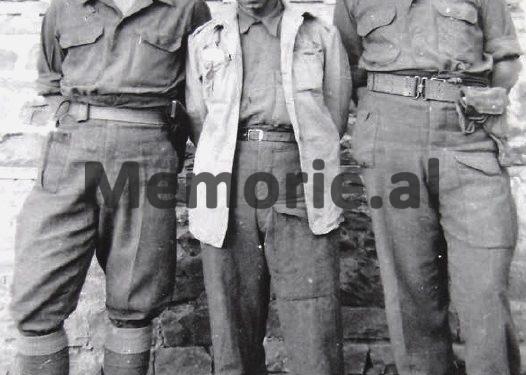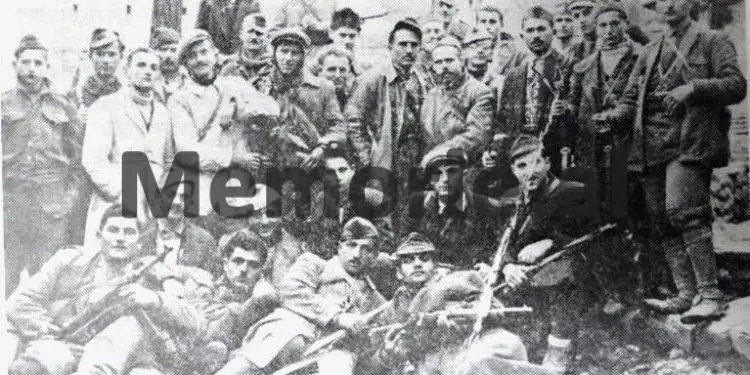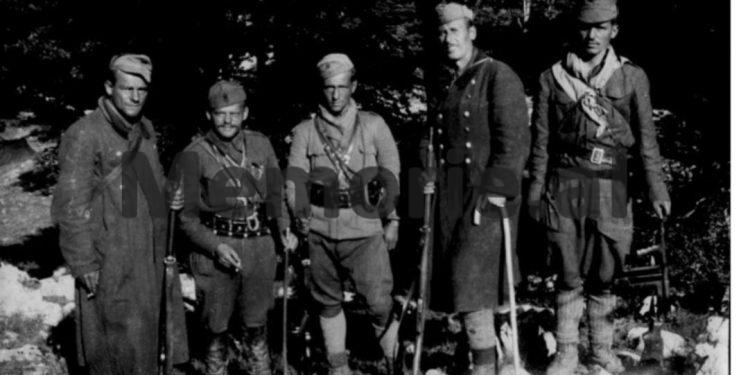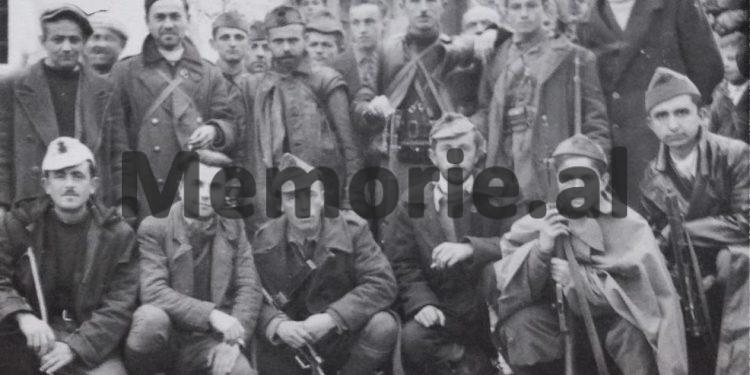By Vangjel Kasapi
Memorie.al / The Kadare family from Gjirokastri is not only known for the world-famous writer Ismail Kadare. In the second decade of this century, one of the branches of this tribe, that of Sadik Kadareja’s family, would become known, especially during the Anti-Fascist War and in the first years after liberation, with the soldier Tahir Kadareja, general of the operational dimensions. -strategic, intellectual with a complete all-round horizon, known for his convictions against the dictatorial monist regime. The cadres have distinguished themselves not only for their patriotism and sense of commitment to the cause of freedom and Albania, but also for their special culture and talent.
Who was Tahir Kadare?
Tahir Kadareja was born on 28.11.1913 in the stone town of Gjirokastra. He received his primary education in his hometown, as well as his secondary education. After that, he came to Tirana, where he entered the Officers’ School, which he completed in August 1931, in the artillery branch, as an officer with the rank of aspirant. After 1933, Tahir Kadareja earned the rank of lieutenant.
He was initially assigned to work at the Army Artillery Command, where he served until 1935. Being a progressive man with demands on himself and the regime, as a man who wanted the country to move forward with the steps of time, he quickly became an opponent of the state regime and, consequently, also an active member of the anti-monarchist movement of Fier (1935), which was led by the well-known colonel in the history of the Army and of Albania, Ali Shefqeti (Shkopi).
Since this movement was quickly suppressed by the regime in power, Kadareja, along with several other military members participating in it, was imprisoned and then exiled to Tepelena. As a result, he lost his right to rank and was dismissed from the Army, by the State Decree dated 12.11.1937, together with Dali Ndreu and Bedri Spahiu.
But, in order not to submit to this situation, he, along with Mustafa Matohiti (“Hero of the People”, martyr of the Anti-Fascist National Liberation War), also with a career in the Royal Albanian Army of this period, escaped to Greece. In April 1939, Albania was invaded by the Italian fascists and in the country, as a counter-reaction, the Anti-Fascist Movement was born.
Tahir Kadareja was one of the first ex-soldiers who was involved in this national movement and who helped significantly for its growth and strengthening, for its concretization with formations and combat activity against the foreign invaders in Gjirokastra District. He dealt with the preparation of the war and the war formations, from the smallest to the largest, thus becoming one of the most popular and leading leaders in the region and in the entire South of Albania.
After all this activity, his culture and military skills, his talent as an outstanding leader and organizer, his coolness, fighting spirit and humanity, courage and loyalty to the ideal to which he was dedicated and for which he fought began to stand out.
With that calm smile and attentive gaze, which expressed the depth and sincerity of his soul and inner world, Tahir Kadareja radiated confidence and friendship for his friends and colleagues, facilitating the realization of difficult and full tasks dangers of war.
With the establishment of the General Staff of the National Liberation Army of Albania, as soon as the first large formation, the 1st Assault Brigade, was formed, Tahir Kadare was entrusted with an important task in leading the brigade, its deputy commander. Here, Tahiri revealed his leadership qualities as a real soldier, for directing the combat actions of this outstanding UNÇSh formation.
For these qualities, immediately after the creation of the 6th Assault Brigade (January 1944), he was appointed by the UNÇSh General Staff as its commander. He led the brigade in a wave of fierce battles and victories against the Nazi invaders, well-known battles in the history of UNCSh and our people.
The actions during the Winter Operation 1943-1944, as well as the Nazi Operation of June 1944 stand out among them. But the harsh and bloody actions in Labinot, Pukë and even Visegrad of the former Yugoslavia are never forgotten. In those and many other combat actions, Tahir Kadareja led with combat skills and imagination at the head of the Brigade Headquarters. Consequently, he had a rapid career.
As soon as the 2nd Assault Division was created (4.8.1944), Tahir was once again entrusted with the command of the division, while on November 18 of this year; he was appointed commander of the Second Corps, which was the second largest formation of the NÇSh Army. This assessment of his abilities is so true and real that the Nazis themselves prove it, in a secret document of the end of 1943, which evaluates and categorizes the anti-fascist resistance groups in Albania.
It was written that; “Bedri Spahiu and Tahir Kadareja were quite capable”, of course it is meant militarily. The liberation of Albania put Kadare in front of a future and new jobs. This was a new chapter, but with many challenges. Shortly after the liberation of the country, he was sent for higher studies to the “Voroshilov” Military Academy in Moscow, which he completed with excellent results.
For this and the skills he possessed, as well as for his achievements during the Anti-Fascist War, he was appointed with duties up to the post of Deputy Chief of the General Staff of the Albanian Army. In 1949, Tahir Kadareja earned the rank of major general and was then assigned to head the Artillery Command of the Albanian Army.
The achievements were deserved; they came only thanks to his qualities, professional skills, his strong character, the dignity and authority he enjoyed among his superiors, subordinates and the people. He especially respected the opinions and opposition of his subordinates, for any work-related problem. Under the rank of general, Kadareja hid a number of values, which were recognized and respected by his friends and associates.
They appreciated him a lot, as they said that he was one of the most prepared, honest and outstanding military leaders of the Anti-Fascist War. After the war, Tahir Kadareja was evaluated as one of the most prepared soldiers, especially in the field of artillery, which significantly influenced and helped in its organization, strengthening and modernization.
But General Kadareja had a special value, but; “bad for the big ones”. Standing out for his stable character, fair, full of achievements and quite skilled in his work, he preferred to express his thoughts openly.
Many people up there did not like this. The name and reputation achieved during the war, the level of duties and ranks, but especially his open and truthful speech, his views often in the opposite direction, from those of the high party or state leadership of the time, were not seen eye to eye good.
This sign of jealousy and hatred, as well as the essence of what was observed in these instances, is also revealed by the writer Ismail Kadare, in one of his publications (1992, in France, where, among other things, he writes that: “General Tahir Kadareja, was during the first years of the war, better known than Enver Hoxha, and perhaps one of the reasons for the latter’s vague hatred towards him was simply the feeling of envy, for a certain legend that still continued about him, among the partisans of old”.
Here, of course, there were truths shrouded in mystery, which became more visible and burst into the open at the Tirana Conference (l956), already known for its so-called destructive activity. There he was severely beaten, along with several senior military officers, for the opinions he openly expressed to the high leadership of the party and the state at that time.
They were accusations, so after that the ordeal of suffering for him and the entire Kadare family began immediately. First came the transfers, then isolation and release from the army and, of course, expulsion from the party ranks.
He was interned in Kuçovo and then, like a desolate ascetic, he was locked up in Zvrnec, where he was also imprisoned. So closed, almost hermetic, and scary not only from his friends, but also from close people, that it was impossible for them to meet him.
From my teenage years, I remember an episode when I was a student at the “Skënderbej” Military School and my mother wanted to pay a courtesy visit to a woman who was close to him and who was suffering from a serious illness. That visit was so secret and disguised that my mother did not dare to tell either my father or my uncle.
In 1962, not yet fifty years old, the heart of the brave former commander, one of the most well-known leaders of the Anti-Fascist War and of the largest formations of the UNCSh, of the most capable general and soldier and with a creative spirit, an outstanding and talented artilleryman, stopped beating. None of his friends and relatives, even relatives, could accompany him to his last apartment!
And how could such a thing be done, when everyone and every action was under control! However, with all the wall of isolation, they kept the image of the commander and the warrior, the general, the good friend and the loving, correct and honest superior, the democratic patriot to the point of dedication. For them, Tahir Kadareja was and remained a man and a soldier with the dimensions of a personality, part of Albanian military history. Memorie.al














